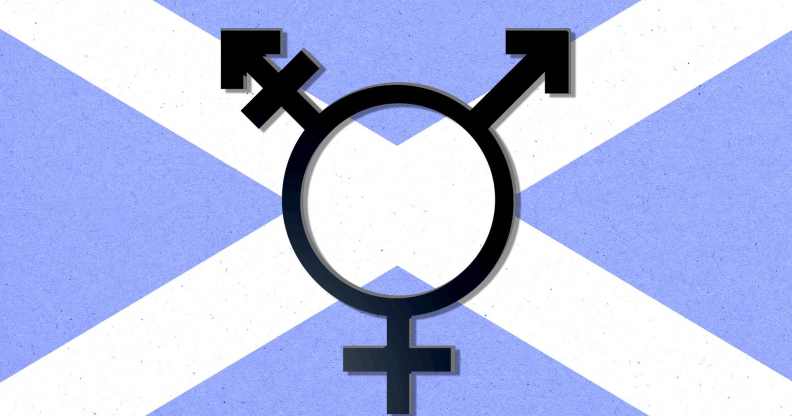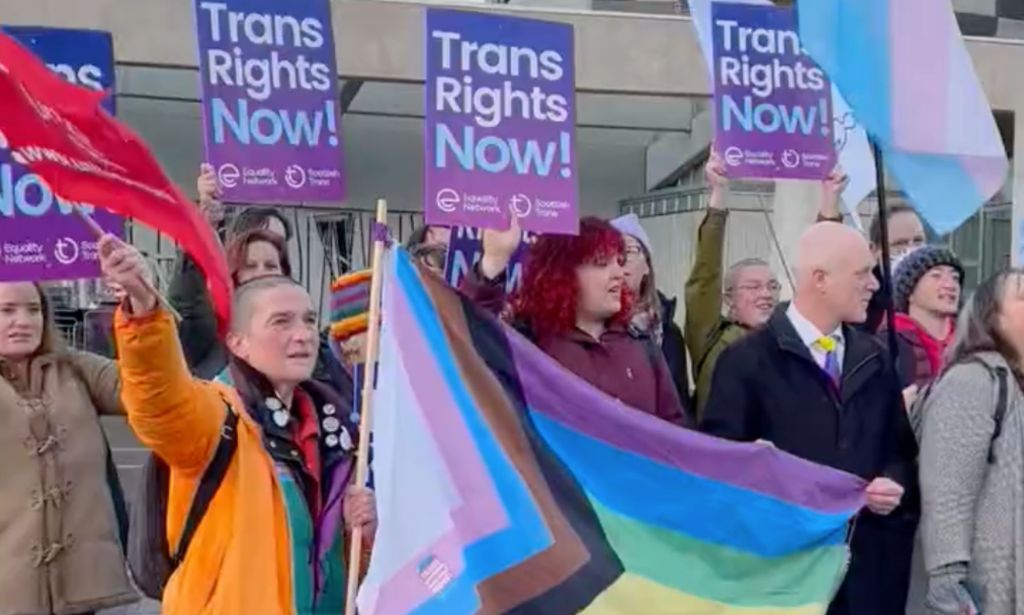Scottish Gender Reform: Who voted for and against, including three Tories who crossed party lines for trans rights

Scotland is poised to pass transformative gender law reforms. (Getty)
Trans people in Scotland will soon face fewer barriers to legal recognition after the Scottish Parliament pushed through its groundbreaking Gender Recognition Reform bill on Thursday (22 December).
The bill, which passed by 86 votes to 39, will reform the Gender Recognition Act in Scotland, allowing trans people to gain legal recognition without the need for a medical diagnosis.
The legislation was described by Stonewall director of nations Colin MacFarlane as “a tremendous step forward for trans rights and for LGBTQ+ people in Scotland”.
The bill was even backed by three members of the Scottish Conservative party, with out gay Tory MSP Jamie Greene saying he voted for the legislation as he believes in “liberty” and “freedom of expression”.
“If I were to vote against this bill to reform gender recognition, then I must look at people like Sue [a trans woman in parliament’s public gallery at the vote] in the eye, and explain why,” Greene said.
“Tomorrow when I wake, I have to look myself in the mirror. I know that one day… I will reflect upon the events of this week, and I will know that I chose the side of history that I believed to be right. The side of history which made another human being’s life better.”
He added that the Conservatives had been the party to bring marriage equality to England and Wales in 2013; one of the reasons why he was happy to vote for the Gender Recognition Reform bill as a Tory.
Below are the results of exactly who voted for and against Scotland’s groundbreaking gender reform bill, including the three Tories who helped push the bill through.
For
- Dr Sandesh Gulhane (Scottish Conservatives)
- Jackson Carlaw (Scottish Conservatives)
- Jamie Greene (Scottish Conservatives)
- Alasdair Allan (SNP)
- Angela Constance (SNP)
- Angus Robertson (SNP)
- Audrey Nicoll (SNP)
- Ben Macpherson (SNP)
- Bill Kidd (SNP)
- Bob Doris (SNP)
- Christina McKelvie (SNP)
- Christine Grahame (SNP)
- Clare Adamson (SNP)
- Clare Haughey (SNP)
- Colin Beattie (SNP)
- Colette Stevenson (SNP)
- David Torrance (SNP)
- Elena Whitham (SNP)
- Emma Harper (SNP)
- Emma Roddick (SNP)
- Evelyn Tweet (SNP)
- Fiona Hyslop (SNP)
- Fulton MacGregor (SNP)
- George Adam (SNP)
- Gillian Martin (SNP)
- Gordon MacDonald (SNP)
- Graeme Dey (SNP)
- Humza Yousaf (SNP)
- Ivan McKee (SNP)
- Jackie Dunbar (SNP)
- James Dornan (SNP)
- Jamie Hepburn (SNP)
- Jenni Minto (SNP)
- Jenny Gilruth (SNP)
- Joe FitzPatrick (SNP)
- John Swinney (SNP)
- Karen Adam (SNP)
- Kaukab Stewart (SNP)
- Keith Brown (SNP)
- Kevin Stewart (SNP)
- Mairi Gougeon (SNP)
- Màiri McAllan (SNP)
- Maree Todd (SNP)
- Marie McNair (SNP)
- Michael Matheson (SNP)
- Natalie Don (SNP)
- Neil Gray (SNP)
- Nichola Sturgeon (SNP)
- Paul McLennan (SNP)
- Richard Lochhead (SNP)
- Rona Mackay (SNP)
- Shirley-Anne Somerville (SNP)
- Shona Robison (SNP)
- Siobhian Brown (SNP)
- Stuart McMillan (SNP)
- Tom Arthur (SNP)
- Willie Coffey (SNP)
- Ariane Burgess (Scottish Greens)
- Gillian Mackay (Scottish Greens)
- Lorna Slater (Scottish Greens)
- Maggie Chapman (Scottish Greens)
- Mark Ruskell (Scottish Greens)
- Patrick Harvie (Scottish Greens)
- Ross Greer (Scottish Greens)
- Alex Rowley (Scottish Labour)
- Anas Sarwar (Scottish Labour)
- Colin Smyth (Scottish Labour)
- Daniel Johnson (Scottish Labour)
- Foysol Choudhury (Scottish Labour)
- Jackie Baillie (Scottish Labour)
- Katy Clark (Scottish Labour)
- Mark Griffin (Scottish Labour)
- Martin Whitfield (Scottish Labour)
- Mercedes Villalba (Scottish Labour)
- Monica Lennon (Scottish Labour)
- Neil Bibby (Scottish Labour)
- Pam Duncan-Glancy (Scottish Labour)
- Paul O’Kane (Scottish Labour)
- Paul Sweeney (Scottish Labour)
- Rhoda Grant (Scottish Labour)
- Richard Leonard (Scottish Labour)
- Sarah Boyack (Scottish Labour)
- Alex Cole-Hamilton (Scottish Liberal Democrats)
- Beatrice Wishart (Scottish Liberal Democrats)
- Liam McArthur (Scottish Liberal Democrats)
- Willie Rennie (Scottish Liberal Democrats)
Against
- Annabelle Ewing (SNP)
- Ash Regan (SNP)
- Fergus Ewing (SNP)
- Jim Fairlie (SNP)
- John Mason (SNP)
- Kenneth Gibson (SNP)
- Michelle Thomson (SNP)
- Ruth Maguire (SNP)
- Stephanie Callaghan (SNP)
- Alexander Burnett (Scottish Conservatives)
- Alexander Stewart (Scottish Conservatives)
- Annie Wells (Scottish Conservatives)
- Brian Whittle (Scottish Conservatives)
- Craig Hoy (Scottish Conservatives)
- Donald Cameron (Scottish Conservatives)
- Douglas Lumsden (Scottish Conservatives)
- Douglas Ross (Scottish Conservatives)
- Edward Mountain (Scottish Conservatives)
- Finlay Carson (Scottish Conservatives)
- Graham Simpson (Scottish Conservatives)
- Jamie Halcro Johnston (Scottish Conservatives)
- Jeremy Balfour (Scottish Conservatives)
- Liam Kerr (Scottish Conservatives)
- Maurice Golden (Scottish Conservatives)
- Meghan Gallacher (Scottish Conservatives)
- Miles Briggs (Scottish Conservatives)
- Murdo Fraser (Scottish Conservatives)
- Oliver Mundell (Scottish Conservatives)
- Pam Gosal (Scottish Conservatives)
- Rachael Hamilton (Scottish Conservatives)
- Roz McCall (Scottish Conservatives)
- Russell Findlay (Scottish Conservatives)
- Sharon Dowley (Scottish Conservatives)
- Stephen Kerr (Scottish Conservatives)
- Sue Webber (Scottish Conservatives)
- Tess White (Scottish Conservatives)
- Carol Mochan (Scottish Labour)
- Claire Baker (Scottish Labour)
What does the Gender Recognition Reform bill mean for trans people in Scotland?
The legislation, which passed its first vote on 27 October, amends the Gender Recognition Act 2004 to lower the age limit to apply for a Gender Recognition Certificate (GRC) from 18 to 16, and shorten the period a trans person would have to wait before legally changing their gender (three months for those over 18, six months for those under).
Trans people would also be able to gain legal recognition without being required to get medical reports or a diagnosis in order to obtain a GRC.
Under current legislation, trans people must apply to a UK gender recognition panel and present reports as well as a diagnosis of gender dysphoria – a process that can take years given the immense wait times at NHS gender clinics.

MacFarlane said the legislation “brings Scotland into line with international best practice” and makes a small change to “bring dignity to trans people who deserve to be legally recognised for who they are”.
“The UK government must now follow and introduce legislation to ensure that trans people UK-wide have access to the same standards of human rights,” MacFarlane added.
How did this story make you feel?

